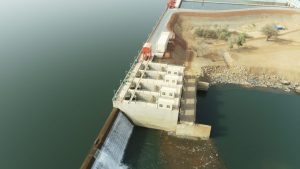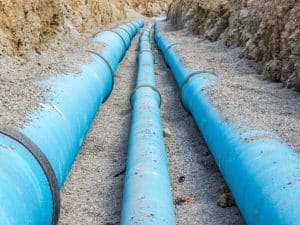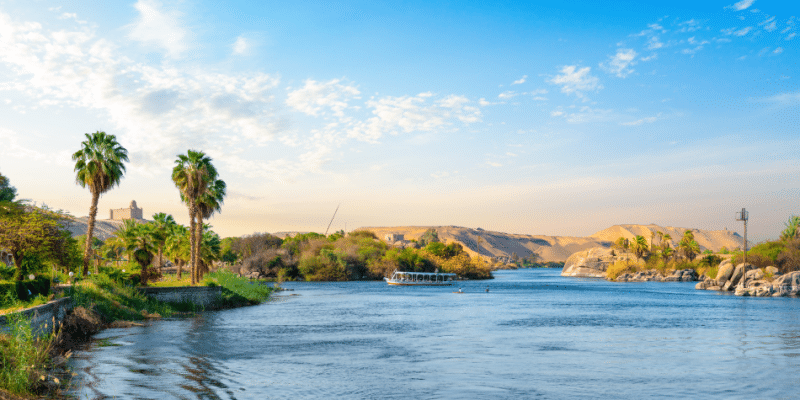While population growth is increasing the need for water, it is drought that is causing this water stress, which has become persistent in several sub-regions of the continent. This situation is at the root of numerous conflicts between states that share water resources. As a way out, some governments have chosen to cooperate. Which ones? Are their strategies bearing fruit? Find the answers in this article, published in conjunction with World Water Day, which is being celebrated on 22 March 2024.
The most concrete and well-known example of a water-related conflict in Africa is undoubtedly the one that has pitted Ethiopia, Egypt and Sudan against each other for more than 10 years over the sharing of the waters of the Nile. Hostilities really got underway in 2012, following the start of construction of the Grand Ethiopian Renaissance Dam (GERD) on the Blue Nile, the Nile’s main tributary in the regional state of Benishangul-Gumuz. The country of the Pharaohs is opposed to this project because it fears a reduction in the flow of the river, which provides 85% of its water supply. Just like Sudan, through which the Nile flows.
And while the filling of the Gerd (storage capacity of 79 billion m3 of water) was completed in the 2nd half of 2023, tensions persist. The authorities in Cairo are demanding a guaranteed minimum annual supply of 40 billion m3, which the Addis Ababa government is refusing to grant so far, since accepting it would mean the operation being spread over more than 7 years, so that the downstream flow would not be too restricted during that time. Ethiopia, on the other hand, plans to wait 3 to 5 years so that it can benefit as quickly as possible from its dam and the positive impacts (electrification of populations, irrigation, etc.) that it will have on the growth of its economy, as well as coping with the drought. When will this conflict end? In July 2023, the Ethiopian and Egyptian leaders issued a joint declaration on “accelerated negotiations”, which should have been completed by now.

Ethiopian Prime Minister Abiy Ahmed and Egyptian President Abdel Fattah el-Sissi©Aby Ahmed
There are other examples of water conflicts in Africa, albeit of lesser importance. These include the conflict between the communities of Pokot and Turkana in Kenya, and the community of Karamojong in Uganda. As a result of the drought, pastoralists have been fighting around watering points reserved for livestock since 2018. At least 3,000 people are thought to have died in five years as a result of these tensions.
These two cases give an idea of the difficulties involved in managing water, particularly across borders in Africa. But while tensions persist between some countries, others have managed to reach compromises on the use of this resource, supported by regional and international organisations. This is particularly true of the Organisation de la mise en valeur du fleuve Sénégal (OMVS), which is playing an exemplary role in ensuring water, food and energy security in the Senegal River Basin, but above all in promoting peace, prosperity and territorial development in its member countries of Mauritania, Senegal, Mali and Guinea.
Waterworks as a vehicle for peace: the West African example
This has been achieved through the construction of water infrastructure, in particular the Diama dam, which marks the border with Mauritania, in the Saint-Louis region of Senegal (north of Dakar). In service since 1986, this “anti-salt” dam has helped to develop agriculture in the Senegal River Valley. And 38 years on, it is a successful example of cross-border water management.

The OMVS network of hydraulic structures also includes the Manantali hydroelectric dam, located 90 km south-east of the town of Bafoulabé in Mali. The dam has a retention capacity of 11 billion m3 of water, 7 billion m3 of which is used to irrigate 255,000 hectares of land. The other two dams built by OMVS are the Félou and Gouina dams, which also contribute to food security by developing irrigated agriculture and improving access to drinking water for local populations.
Sharing the economic benefits of water in East Africa Another organisation working to manage water for peace in Africa is the Lake Victoria Basin Commission (LVBC). The organisation is responsible for the integrated management of this freshwater lake covering some 68,800 km2, which plays a vital role for local communities in Kenya, Uganda, Tanzania and Rwanda.
There is also the Nile Basin Initiative (NBI), a partnership between the 10 Nile riparian states whose mission is to “develop the river cooperatively, share substantial socio-economic benefits and promote regional peace and security”. In particular, the NBI is supporting the construction of the Akanyarun dam, a joint project between Rwanda and Burundi to supply drinking water to 614,200 people in the two countries, and to provide water for the irrigation of 12,474 hectares of farmland.
Signing up to international conventions
In addition to inter-state commitments, several African countries have decided to place their trust in international organisations to support them in improving the management of their water resources. At least ten African countries ratified the United Nations Economic Commission for Europe (UNECE) Convention on the Protection and Use of Transboundary Watercourses and International Lakes between 2018 and 2024. These are Chad and Senegal in 2018, Ghana (in 2020), Guinea Bissau and Togo in 2021, Uganda and Nigeria in 2022, Namibia in 2023 and Burkina Faso in 2024. In Niger, the process should be completed shortly.
Still known as the Helsinki Water Convention, the instrument adopted in 1992 in Helsinki, Finland, is based on a legal corpus of rights and defines the obligations of countries located upstream and downstream of watercourses. By adhering to this convention, each State undertakes to prevent, control and reduce any transboundary impact on the environment, human health and safety, and the socio-economic situation. The United Nations (UN) also calls on stakeholders to enter into transboundary agreements and establish joint bodies for cooperation in the management and protection of their transboundary waters.
Strengthening water cooperation agreements in Africa
At the launch of the Water-Peace-Security Initiative in 2015 in New York, in the United States of America, the President of the Republic of Senegal, Macky Sall, also stated that “water is a source of life and well-being when its use calls for a spirit of cooperation and sharing”.
And recently, we have seen a strengthening of the commitment of certain countries to support the policy of supplying drinking water to their drought-stricken neighbours in order to save lives. Ethiopia, for example, has been supplying more than 20,000 m3 of drinking water a day to the capital of Djibouti since 2017, as part of a cross-border drinking water supply project between the two countries. This capacity will be increased to 100,000 m3 through extension works. This resource will be provided free of charge for 30 years, under the terms of the agreement between the two neighbouring countries, which serves as a model for regional integration in East Africa.
In March 2024, Zimbabwe also pledged to support its neighbour South Africa in its policy of securing access to drinking water. From now on, some of the water treated (15 million m3 of drinking water per year) at its Beitbridge drinking water treatment plant will be transferred to the dried-up South African town of Musina.

Drinking Water Pipe©ThomBal/Shutterstock
In addition to drought, population growth, pollution and the unequal distribution of water resources are also cited as causes of water shortages and hence conflicts in Africa and around the world. And on the occasion of World Water Day 2024, the UN points out that “cooperation in the field of water can create a positive ripple effect that promotes harmony, generates prosperity and strengthens resilience in the face of common challenges”. However, the organisation regrets that “of the more than 37 billion people in the world who depend on transboundary water resources, only 24 countries have concluded cooperation agreements for all their shared water resources”. The call for collaboration should therefore be reinforced on 22 March 2024.
Inès Magoum







You must be logged in to post a comment.